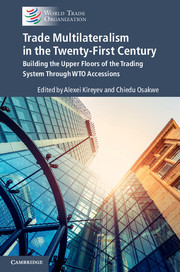 Trade Multilateralism in the Twenty-First Century
Trade Multilateralism in the Twenty-First Century from PART I - WTO Accessions and the New Trade Multilateralism
Published online by Cambridge University Press: 28 November 2017
Abstract
Long proposed in aspirational terms, good governance has increasingly become a subject of substantive global policy debate and international rule-making. An analysis of recent negotiating exercises, such as World Trade Organization (WTO) accession protocols and the WTO Trade Facilitation Agreement (TFA), shows that governance has been discussed among WTO members and embedded in WTO rules. This chapter first examines how WTO accession protocols addressed the issue of governance improvement by subjecting acceding governments to binding, accession-specific commitments. These commitments, in addition to ensuring greater market openness and integration in the rules-based global economy, established the legal basis for the increased rule of law for acceding members. The commitments undertaken by these members demonstrate their adherence to principles of transparency and predictability of trade policies, as well as their overall commitment to subject domestic trade regimes to international trade law. Improved governance is achieved through the entirety of WTO accession-specific commitments on rules, including the ones on transparency, policy enforcement, trading rights, state trading/state-owned enterprises (STEs/SOEs) and government procurement. A similar trend can be observed when analysing the good governance provisions of the new TFA, albeit with differences in their modus operandi. WTO members took a multifaceted and indirect approach, seeking to improve integrity by increasing transparency, strengthening due process rights and reducing space for discretionary action. Together, good governance provisions in accession protocols and the TFA contribute to building the upper floors of the new multilateral trading system by creating a binding set of rules and new standards that will be respected by virtually the entire trading world.
Good governance – commonly understood as taking and implementing sound government decisions – has been a much-discussed objective of international public policy for decades, to the point where it is now considered an indispensable ‘bedrock’ principle of global affairs. As far back as the 1990s, former United Nations (UN) Secretary-General Kofi Annan hailed it as perhaps the single most important factor in eradicating poverty and promoting development. But while this objective has long been pursued in aspirational terms, the world's good intentions have not always been matched by concrete actions. Frequently confined to best-endeavour undertakings, good governance rarely found its way into firm international commitments and binding global rules.
To save this book to your Kindle, first ensure [email protected] is added to your Approved Personal Document E-mail List under your Personal Document Settings on the Manage Your Content and Devices page of your Amazon account. Then enter the ‘name’ part of your Kindle email address below. Find out more about saving to your Kindle.
Note you can select to save to either the @free.kindle.com or @kindle.com variations. ‘@free.kindle.com’ emails are free but can only be saved to your device when it is connected to wi-fi. ‘@kindle.com’ emails can be delivered even when you are not connected to wi-fi, but note that service fees apply.
Find out more about the Kindle Personal Document Service.
To save content items to your account, please confirm that you agree to abide by our usage policies. If this is the first time you use this feature, you will be asked to authorise Cambridge Core to connect with your account. Find out more about saving content to Dropbox.
To save content items to your account, please confirm that you agree to abide by our usage policies. If this is the first time you use this feature, you will be asked to authorise Cambridge Core to connect with your account. Find out more about saving content to Google Drive.